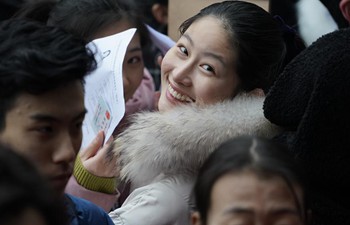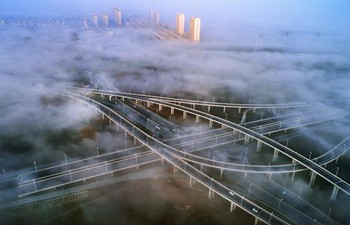By Oliver Trust
BERLIN, Feb. 27 (Xinhua) -- The German Bundesliga's disappointing performance on the international stage this season has sparked heated discussions about how to run professional football in the country.
Fan and club interest seem to be colliding and have erupted in widespread fan protests. Thousands of supporters in Frankfurt and Dortmund boycotted two Monday evening games and used the unpopular matches to express their disapproval with banners, reducing the noise level and throwing tennis balls on the pitch.
Monday games have recently been started by all 36 first and second division clubs to create additional marketing resources. But at the center of the dispute is the strict "50 + 1 rule" governing the ownership of clubs, which restricts a single investor from gaining a majority share in any particular club.
Traditionalists fear a repeal of the rule will lead to an increase in commercialization, deprive football of its roots and widen the gap between clubs and supporters. Fans insist on being a vital part of club life and demand a role in the decision-making process. Opening the door to investors to take over clubs could ostracize fans.
Clubs however fear the gulf between the Bundesliga and prosperous leagues like the English Premier League will get even bigger if attempts fail to attract new sponsoring partners or shareholders.
Christian Seifert, the head of the league association, Deutsche Fu?ball Liga (DFL), has demanded greater efforts to improve German clubs' performance in international markets, saying he expects a solution by the end of 2018.
Seifert says the Bundesliga should open its doors for new investment structures if German football wants to avoid losing its position in world football. He called it a simple calculation, "clubs investing more can count on stronger squads that achieve more success." The money for the investments has to come from somewhere, Seifert said.
But innovations in the German league seem uncertain as not only the "50 + 1 rule" is being called into question, but also the general approach when it comes to protecting the values of football in the country. Over the years, standing room in stadiums, moderate ticket prices and strict rules governing the clubs' economic health through financial fair play have been guaranteed.
Due to the apparent disagreement among the professional clubs, it seems unlikely there will be any solution.
Bayer Leverkusen CEO Michael Schrade is demanding new options for the clubs in order "to close the growing gap with other top European teams".
Dortmund's CEO Hans-Joachim Watzke emphasizes that the success of international sides like Real Madrid, FC Barcelona and Bayern Munich relies on the basic idea of the majority of shares remaining in the hands of the clubs.
Success is possible also when strict rules are enforced, Watzke stressed.
Smaller clubs like SC Freiburg fear that healthy structures and sustainability will no longer determine whether a team is successful or not but the power of an investor. Clubs would be degraded to playthings of outside interests. Without regulations, the football business is in danger to getting out of control and losing its social duties. Freiburg officials say football is in danger of losing its fans.
If changes are considered, "we need to protect German clubs from investor hopping," says Andreas Rettig. The CEO of the DFL and current CEO of the second division side FC St. Pauli demands that clubs need to be given the right of first refusal when an investor is selling his or her shares. Rettig opposes substantial changes to the "50 + 1 rule".
Rettig called the Bundesliga the antithesis to the English Premier League, where fans complain about rising ticket prices and the rift between normal supporters and clubs dominated by profit-minded investors.
Bayern Munich CEO Karl-Heinz Rummenigge said the Bundesliga is the last league of Europe's "big five" that insists on the luxury of such a rule.
The Bundesliga needs to implement new rules based on financial fair play that helps avoid "economic adventurism", commented Rummenigge.

















